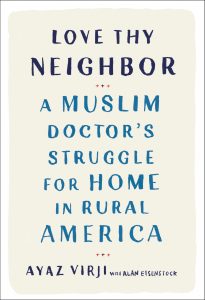 By: Terri Schlichenmeyer
By: Terri Schlichenmeyer
Your best friend loves country music but you can’t stand it.
He likes a good glass of beer after work; you prefer plain water. She’s a jeans-and-tees kind of woman, but you’re more button-down. You’re yin and yang, each quite different from the other but as in the new book “Love Thy Neighbor” by Ayaz Virji (with Alan Eisenstock), you’re more alike than you think.
Practicing “turnstile medicine” was never his thing.
In hospital-as-corporation, though, that’s often the way things are done and Dr. Ayaz Virji didn’t like it. Keeping one eye on the clock while he cared for patients wasn’t how he thought a doctor should practice medicine, so he was ready to move his family from their Pennsylvania home, maybe to a rural area that badly needed a doctor. Statistically, he says, in rural areas, there’s one doctor for every 1,900 patients. He could do good things in a small town.
And that’s how he ended up in tiny, almost-all-white Dawson, Minnesota, where his family’s Muslim faith and their brown faces set them apart.
Being “Minnesota nice,” Dawson was welcoming.
Virji’s family quickly became part of the community and Virji worked to make the hospital a first-class place for healthcare. He opened a weight-loss clinic that attracted patients nationwide, his wife opened a skin-care clinic, the kids settled in at school, and the family adjusted to Minnesota winters.
Then came the election of 2016, when most of the county’s citizens voted Republican.
Seeing what was in store for Muslim families like his, Virji became uncharacteristically confrontational, emotional, and outraged at what had happened. He decided to step down at the hospital, leave Minnesota, and move to Dubai but Virji’s family wanted to stay; friends, a little shocked themselves, rallied in support, but racists were emboldened by politics and sent hate messages. When a local pastor’s intern asked Virji to speak about his faith at a public forum, he agreed, but the outcome was mixed.
“What,” he asked about tolerance, “will it take?”
Looking at “Love Thy Neighbor,” you might think it’s a memoir with a happy ending, but no. For starters, with politics as they are today and immigration in flux, this books’ real ending may be years away.
Opening with a detailed recount of a speech that feels more like a lecture, author Ayaz Virji then shifts to a fish-out-of-water tale with light amusement as he writes about his new and beloved hometown. That’s charming but beware: just pages in, this story takes two abrupt, parallel, and unexpected turns – one deeply political and the other, deeply instructional, as Virji spends pages describing anger at the open and sudden racism he experiences, and more pages teaching readers about how Islam compares to Christianity. The former is understandable and sympathetic readers will be outraged; the latter is interesting but it’s too intense and feels rather ill-placed.
If you’re expecting that, you might welcome the info but if you’re not, head’s up. “Love They Neighbor” is well-done and readable, but it’s also very, very different.




